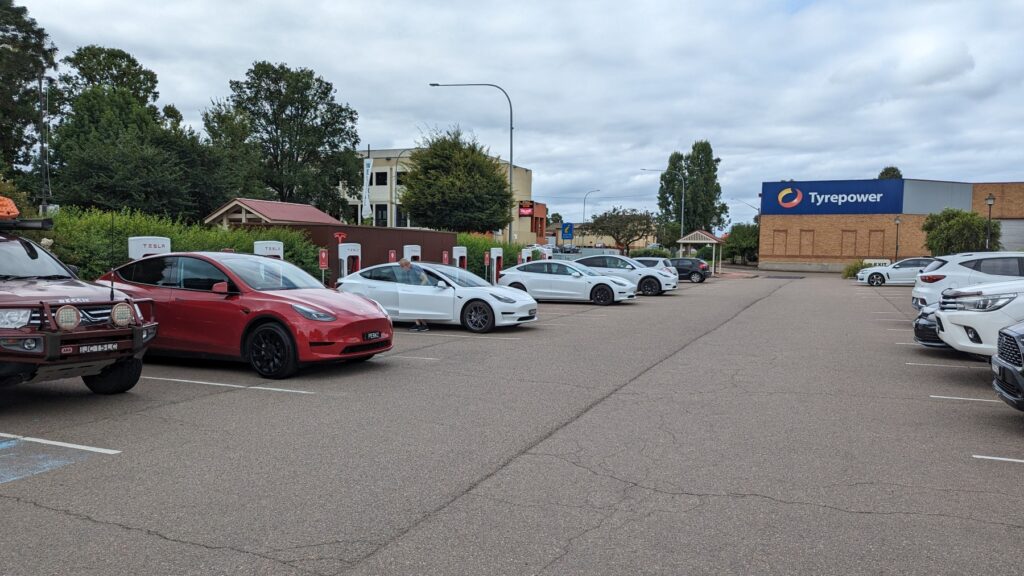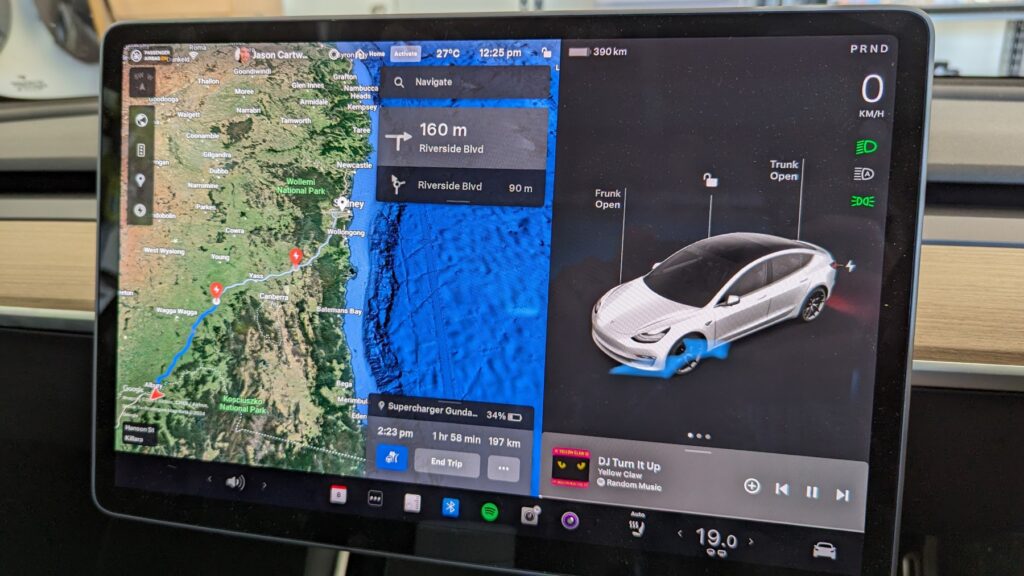This afternoon I headed off on the latest road trip, this one from Wodonga to Sydney for the Electrify Everything event this weekend. The drive is a decent one at 565km, transiting from Victoria, up past the ACT and finally to NSW.
To prepare for the trip, I charged last night to 90%, then had a small amount of driving in town, before grabbing a drink from 7/11, inflating the tyres to 42psi and I was on my way.
My EV road trip today was completed in 6 hours and 19 minutes, a journey that Google Maps suggested would take 5 hours and 53 minutes, without accommodating for charging time, making the journey just 26 minutes longer.
Recently there’s been plenty of stories about how long EV charging takes, but I’m here to give a real life example of what it’s like to own and travel long distances in an EV.
Road trip start time in Wodonga – 12:36PM
My trip started at 12:36PM (the time of my transaction at 7/11) according to Google Pay. I drove north up the Hume Hwy to Gundagai. The trip very easy, leveraging Autopilot the entire way, with the only disengagements being two times where I needed to dodge a couple of ratchet straps that had clearly not been secured and ended up on the road.
In the future, I hope that Autopilot/FSD can detect debris on the road like this and avoid it, but for now humans are responsible and required to take over.
Navigate on Autopilot does suggest some unnecessary lane changes, so I left lane change confirmation enabled and used the stalks to confirm when I was ready to move, not as slick as this being fully automated, but not the end of the world. Again, I expect this to be improved in the future.
Stop 1 – Gundagai Supercharger
Tesla’s navigation predicted that I’d reach Gundagai at 2:25PM, the metadata on the first photo I took there was 2:29PM, pretty damn close, particularly given I wasted a couple of minutes circling around the roadworks at the site, so the accuracy was really impressive.
The car estimated that I needed 15 minutes of charging to continue the trip. I used the time to make a pit stop and grab a drink at Olivers. My Google Pay transaction has this at 2:34PM. Having enjoyed a quick break, the car was ready before I finished and notified me as much on the mobile app and the screen when re-entering the car, one of the features I really appreciate.
Just 2 of the 6 Superchargers were in use (this included my car). I took the last photo at 2:42PM and was on my way to Goulburn.

Stop 2 – Goulburn Supercharger
Tesla’s navigation predicted that I’d reach Goulburn at 4:31PM. The metadata on my first photo at the Supercharger was actually 4:25PM, meaning I beat the prediction.
Again this was an incredibly easy drive, using Autopilot the entire way. There was no disengagements on this leg of the trip and my job as a drive was little more than hold the steering wheel and watch the movie play out in front of my eyes through the windscreen.
I took a quick walk across to the park across the road, then spotted a nearby cafe and headed in for a coffee and a bite to eat. The coffee and sausage roll took about 5 minutes to be made and another 10 to consume after which I returned to the car to find again it was waiting on me.
I decided to stay a few additional minutes to provide more than enough charge, to ensure I had plenty for the few days it’d likely be sitting still in Sydney (I’ll head to a charger before heading home on Sunday).
At 4:47PM I left Goulburn for the last leg of the journey and headed for Sydney.
Road trip end time in Sydney – 6:55PM
The new ETA was 6:46PM, but I was a lot less confident given the potential for Sydney traffic, accidents, roadworks to delay the time of arrival. Thankfully the 2 hour journey was very close to that, arriving just 9 minutes later than predicted at 6:55PM.
The additional time was mostly thanks to some drivers doing 5-7kms less than the speed limit, but traffic didn’t allow overtaking.
I will say there’s stretches of roadway in Sydney that have construction beside them and the standard speed was reduced from 100km/h to 80km/h. It is wild how many people speed here, it’s not one or two, almost every vehicle was moving to alternative lanes and overtaking, at times the delta between our vehicles felt dangerous.
As someone who enjoys Autopilot’s ability to detect and adapt to speed signs, I love that I am never at risk of getting a fine from speeding, if only everyone else had this technology, maybe we’d have safer roads.
I did experience something new for the first time. On one of the freeway entrance ramps, the speed zone increased from 80 to 110km/h, and prior to the 110km/h sign, the car accelerated, almost as if it was attempting to match the speed of the cars already on the freeway. While we don’t have FSD Beta in Australia, this felt a lot like the speed matching feature they have in the US. By accelerating slightly before the sign (where many humans actually would), the car was able to slow the rate of acceleration, making the experience nicer for occupants. Remember this was a single lane on-ramp and felt safe, almost better doing this behaviour than waiting for the arbitrary sign position.
Arriving at my accommodation at 6:55PM, there was time to grab dinner before the sunset and explore Sydney Olympic Park before the start of Electrify Everything tomorrow.

Cost of EV charging
Thanks to the amazing techAU fans that leveraged our referral code, I’m enjoying free Supercharging due to referral credits – https://ts.la/jason45054. When you finish charging, even with free credits, it shows you on screen how much it would have cost, unfortunately I didn’t capture this each time and there’s no way to get back to this data.
Generally EV charging is somewhere between 1/3 and 1/2 the price of refueling an ICE vehicle, but this does vary based on charger pricing at each location, congestion etc.
From previous experience, with similar length charging sessions, I generally see numbers between $13 and $20. If I had to guess what the trip would have cost if paid, it’d be under $25 and that’d include the charging the night before to 90%. The Tesla App shows that I used 145km of credits at Gundagai and 220km of credits at Goulburn and I arrived with 170kms of charge remaining.
For context, I probably spent around the same on food and drink for the trip.
Overall
Overall the drive was made incredibly easy thanks to Autopilot keeping the car centered in the lane and adapting to the cars ahead. Removing a significant portion of the mental energy required for a road trip like this, means you get out fresh and ready to go at your destination, rather than looking for the nearest bed. The charging time was absolutely not a problem, with the car often waiting for me, instead of the other way around.
If you have any questions, please leave them below.
>>> Read full article>>>
Copyright for syndicated content belongs to the linked Source : TechAU – https://techau.com.au/my-565km-roadtrip-to-everything-electric-in-a-tesla-model-3-completed-in-just-6hrs-19mins/










